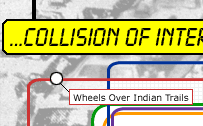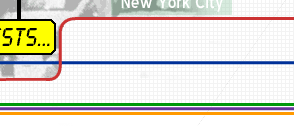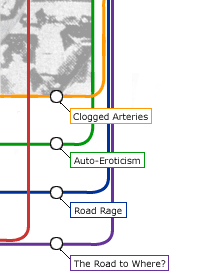



Situationist Theses on Traffic || How Traffic Destroys the Eco-City || Killed by Automobile || Excess
The Social Ideology of the Motorcar
by Andre Gorz
The worst thing about cars is that they are like castles or villas by the sea: luxury goods invented for the exclusive pleasure of a very rich minority, and which in conception and nature were never intended for the people. Unlike the vacuum cleaner, the radio, or the bicycle, which retain their use value when everyone has one, the car, like a villa by the sea, is only desirable and useful insofar as the masses don't have one. That is how in both conception and original purpose the car is a luxury good. And the essence of luxury is that it cannot be democratised. If everyone can have luxury, no one gets any advantages from it. On the contrary, everyone diddles, cheats, and frustrates everyone else, and is diddled, cheated, and frustrated in return.
This is pretty much common knowledge in the case of the seaside villas. No politico has yet dared to claim that to democratise the right to vacation would mean a villa with private beach for every family. Everyone understands that if each of 13 or 14 million families were to use only 10 meters of the coast, it would take 140,000km of beach in order for all of them to have their share! To give everyone his or her share would be to cut up the beaches in such little strips-or to squeeze the villas so tightly together-that their use value would be nil and their advantage over a hotel complex would disappear. In short, democratisation of access to the beaches point to only one solution-the collectivist one. And this solution is necessarily at war with the luxury of the private beach, which is a privilege that a small minority takes as their right at the expense of all.
Now, why is it that what is perfectly obvious in the case of the beaches is not generally acknowledged to be the case for transportation? Like the beach house, doesn't a car occupy scarce space? Doesn't it deprive the others who use the roads (pedestrians, cyclists, streetcar and bus drivers)? Doesn't it lose its use value when everyone uses his or her own? And yet there are plenty of politicians who insist that every family has the right to at least one car and that it's up to the "government" to make it possible for everyone to park conveniently, drive easily in the city, and go on holiday at the same time as everyone else, going 70 mph on the roads to vacation spots.
The monstrousness of this demagogic nonsense is immediately apparent, and yet even the left doesn't disdain resorting to it. Why is the car treated like a sacred cow? Why, unlike other "privative" goods, isn't it recognised as an antisocial luxury? The answer should be sought in the following two aspects of driving:
1. Mass motoring effects an absolute triumph of bourgeois ideology on the level of daily life. It gives and supports in everyone the illusion that each individual can seek his or her own benefit at the expense of everyone else. Take the cruel and aggressive selfishness of the driver who at any moment is figuratively killing the "others," who appear merely as physical obstacles to his or her own speed. This aggressive and competitive selfishness marks the arrival of universally bourgeois behaviour, and has come into being since driving has become commonplace. ("You'll never have socialism with that kind of people," an East German friend told me, upset by the spectacle of Paris traffic).
2. The automobile is the paradoxical example of a luxury object that has been devalued by its own spread. But this practical devaluation has not yet been followed by an ideological devaluation. The myth of the pleasure and benefit of the car persists, though if mass transportation were widespread its superiority would be striking. The persistence of this myth is easily explained. The spread of the private car has displaced mass transportation and altered city planning and housing in such a way that it transfers to the car functions which its own spread has made necessary. An ideological ("cultural") revolution would be needed to break this circle. Obviously this is not to be expected from the ruling class (either right or left).
Let us look more closely now at these two points.
When the car was invented, it was to provide a few of the very rich with a completely unprecedented privilege: that of travelling much faster than everyone else. No one up to then had ever dreamt of it. The speed of all coaches was essentially the same, whether you were rich or poor. The carriages of the rich didn't go any faster than the carts of the peasants, and trains carried everyone at the same speed (they didn't begin to have different speeds until they began to compete with the automobile and the aeroplane). Thus, until the turn of the century, the elite did not travel at a different speed from the people. The motorcar was going to change all that. For the first time class differences were to be extended to speed and to the means of transportation.
This means of transportation at first seemed unattainable to the masses -- it was so different from ordinary means. There was no comparison between the motorcar and the others: the cart, the train, the bicycle, or the horse-car. Exceptional beings went out in self-propelled vehicles that weighed at least a ton and whose extremely complicated mechanical organs were as mysterious as they were hidden from view. For one important aspect of the automobile myth is that for the first time people were riding in private vehicles whose operating mechanisms were completely unknown to them and whose maintenance and feeding they had to entrust to specialists. Here is the paradox of the automobile: it appears to confer on its owners limitless freedom, allowing them to travel when and where they choose at a speed equal to or greater than that of the train. But actually, this seeming independence has for its underside a radical dependency. Unlike the horse rider, the wagon driver, or the cyclist, the motorist was going to depend for the fuel supply, as well as for the smallest kind of repair, on dealers and specialists in engines, lubrication, and ignition, and on the interchangeability of parts. Unlike all previous owners of a means of locomotion, the motorist's relationship to his or her vehicle was to be that of user and consumer-and not owner and master. This vehicle, in other words, would oblige the owner to consume and use a host of commercial services and industrial products that could only be provided by some third party. The apparent independence of the automobile owner was only concealing the actual radical dependency.
The oil magnates were the first to perceive the prize that could be extracted from the wide distribution of the motorcar. If people could be induced to travel in cars, they could be sold the fuel necessary to move them. For the first time in history, people would become dependent for their locomotion on a commercial source of energy. There would be as many customers for the oil industry as there were motorists -- and since there would be as many motorists as there were families, the entire population would become the oil merchants' customers. The dream of every capitalist was about to come true. Everyone was going to depend for their daily needs on a commodity that a single industry held as a monopoly.
All that was left was to get the population to drive cars. Little persuasion would be needed. It would be enough to get the price of a car down by using mass production and the assembly line. People would fall all over themselves to buy it. They fell over themselves all right, without noticing they were being led by the nose. What, in fact, did the automobile industry offer them? Just this: "From now on, like the nobility and the bourgeoisie, you too will have the privilege of driving faster than everybody else. In a motorcar society the privilege of the elite is made available to you."
People rushed to buy cars until, as the working class began to buy them as well, defrauded motorists realised they had been had. They had been promised a bourgeois privilege, they had gone into debt to acquire it, and now they saw that everyone else could also get one. What good is a privilege if everyone can have it? It's a fool's game. Worse, it pits everyone against everyone else. General paralysis is brought on by a general clash. For when everyone claims the right to drive at the privileged speed of the bourgeoisie, everything comes to a halt, and the speed of city traffic plummets -- in Boston as in Paris, Rome, or London -- to below that of the horsecar; at rush hours the average speed on the open road falls below the speed of a bicyclist.
Nothing helps. All the solutions have been tried. They all end up making things worse. No matter if they increase the number of city expressways, beltways, elevated crossways, 16-lane highways, and toll roads, the result is always the same. The more roads there are in service, the more cars clog them, and city traffic becomes more paralysingly congested. As long as there are cities, the problem will remain unsolved. No matter how wide and fast a superhighway is, the speed at which vehicles can come off it to enter the city cannot be greater than the average speed on the city streets. As long as the average speed in Paris is 10 to 20 kmh, depending on the time of day, no one will be able to get off the beltways and autoroutes around and into the capital at more than 10 to 20 kmh.
The same is true for all cities. It is impossible to drive at more than an average of 20 kmh in the tangled network of streets, avenues, and boulevards that characterise the traditional cities. The introduction of faster vehicles inevitably disrupts city traffic, causing bottlenecks -- and finally complete paralysis.
Back to top